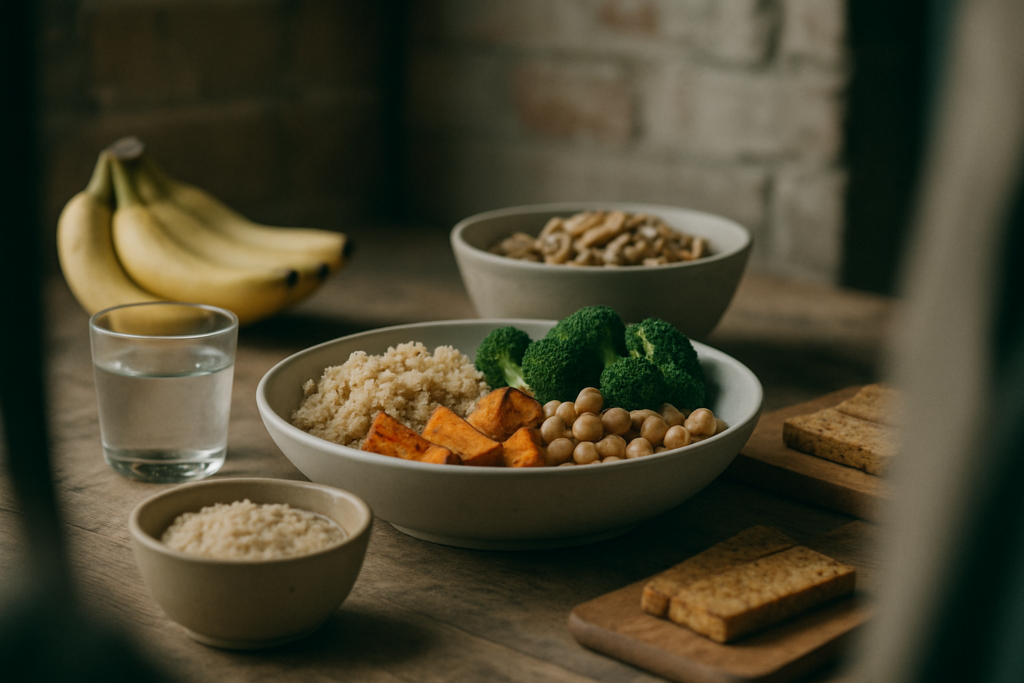Why More Runners Are Going Plant Based
Over the last few years, plant based eating has moved from a fringe idea to a common feature in elite race camps and local running clubs alike. You’ll find pros fueling ultramarathons on lentils and tempeh, and weekend 5K warriors rebuilding with smoothies and turmeric shots. It’s not fringe anymore it’s performance focused.
Why? The benefits hit hard where it counts. Plant based diets are linked to lower inflammation, which helps speed up recovery between training blocks. Many athletes experience better digestion, more energy stability during long runs, and less soreness after hard efforts. Fiber rich meals also support a healthy gut microbiome which matters more than most runners think when it comes to immunity and endurance.
One of the biggest myths is that you’ll lose strength or lack calories on a vegan diet. The truth is, with smart planning, plant based diets meet or exceed what runners need. There’s more than enough protein in foods like lentils, tofu, seitan, and plant based shakes to support muscle repair. And calorie dense options like avocados, nuts, and whole grains keep energy levels up for the long haul.
Bottom line: plant based isn’t a compromise it’s a competitive edge, if you use it right.
Core Principles of a Vegan Runner’s Diet
Running on plants isn’t about restriction it’s about giving your body fuel that works as hard as you do. At the core is a high carb, nutrient dense foundation. Carbs are your primary energy source, especially on longer runs and high mileage weeks. Think whole grains, fruits, root vegetables, and legumes. These not only fuel endurance but also bring along fiber, antioxidants, and key vitamins.
Protein matters too, but you don’t need a steak to recover well. Grab your amino acids from lentils, black beans, tofu, tempeh, seitan, and clean plant based protein powders. They’re easier on digestion than some animal products and still help you rebuild after tough sessions.
Don’t shy away from fats. Healthy fats from nuts, seeds, olives, and avocado are your friends. They keep hormones balanced and joints happier over the long haul. Sprinkle seeds into your oatmeal, toss avocado into post run wraps, or down a handful of almonds with a banana before you head out.
Then there are the micronutrients B12, iron, zinc, and omega 3s. These are make or break for energy, recovery, and staying in peak shape. You’ll need to supplement B12 no way around it. For iron, load up on lentils, spinach, and pump it further with a squeeze of citrus for absorption. Zinc hangs out in whole grains, nuts, and legumes. And omega 3s? Flaxseed, chia seeds, and walnuts have your back, or you can go with an algae oil capsule if you want to keep it dialed in.
No need to guess or overthink it plant based performance just takes a bit of intention and consistency. The results speak for themselves.
Daily Meal Strategy for Peak Performance

When you fuel right and time it well, a plant based diet can work with your training not against it.
Pre run Fuel: Simple, Fast Carbs
You want energy, not a stomachache. Go for quick digesting carbs like a banana with a spoon of almond butter, a slice of toast with jam, or a small smoothie. Eat 30 60 minutes before lighter runs. For longer efforts, a bowl of oats with berries an hour or two out gives more staying power without sitting heavy.
Post run Recovery: Macro Balanced Meals
After you run, you’re in rebuild mode. The sweet spot is a mix of carbs, protein, and fat think rice, lentils, avocado; quinoa with roasted veggies and tahini; or a plant protein smoothie with banana, spinach, and hemp seeds. Get this in within the first 30 60 minutes to start muscle repair and top up glycogen.
Timing Around Training
Your body runs best on a rhythm. If you train early, front load your carbs the night before. If you’re a nighttime runner, don’t go in fasted have a light afternoon snack. Meals around workouts shouldn’t be heavy but should be consistent don’t skip, then binge. Energy crashes kill performance more than pace.
Hydration the Plant Based Way
Dehydration creeps in fast, especially on a fiber rich diet. Load up early in the day with water, and for longer runs, add electrolyte powder or a pinch of salt and lemon to your bottle. Coconut water helps too, but don’t rely solely on it it’s low in sodium. Smooth but steady hydration supports digestion, recovery, and stamina.
Eat simple, eat often, and match your intake to your output. That’s plant powered performance in a nutshell.
Smart Plant Based Foods for Muscle Recovery
Your run’s done now the real work starts. Recovery begins in the first 30 minutes post exercise, when your body is screaming for fuel to repair muscle damage and restock glycogen stores. Skip the guesswork: go straight for what works.
Start with smoothies. They’re fast, digestible, and easy to load with performance nutrition. Blend frozen berries, banana, plant protein powder, almond milk, chia seeds, and a handful of spinach. Want more substance? Build a recovery bowl. Think quinoa, roasted sweet potato, black beans, avocado, and a splash of tahini. Add sauerkraut or kimchi for a gut friendly bonus.
Power packed snacks help when you’re on the move: date and nut bars, protein bites, or even a whole grain toast with almond butter and hemp seeds can hit the macro sweet spot.
Look for key nutrients like plant based protein (to rebuild), complex carbs (to refill glycogen), and anti inflammatory ingredients (like turmeric, ginger, and berries). Don’t forget fermented foods they support digestion and immunity, both critical when training intensifies.
Dial it all in with intention. Your post run fuel isn’t just food it’s recovery strategy.
Check out our guide on nutrition for recovery.
Pro Tips to Avoid Common Pitfalls
When mileage goes up, so should your calories simple as that. Under fueling is a fast track to burnout, injury, or just feeling flat during your runs. Plant based runners need to be extra mindful here. You’re burning through more than just carbs; your body’s asking for steady, nutrient rich fuel to keep recovery on point.
Iron and B12 are the big ones to watch. A drop in either can wreck your energy levels. Regular blood work helps, and in many cases, so do supplements. B12 especially it’s hard to get enough through diet alone. No shame in getting a little help where it counts.
Race day? Ease up on the fiber. What’s great for gut health on normal days can turn into a nightmare mid race. Shift toward low residue meals in the 24 48 hours before competition. Think white rice, simple toast, bananas boring, but effective.
And when things get busy (which they will), meal prep is your lifeline. Batch cook grains, roast veggies, prep protein in bulk whatever reduces decision fatigue. It’s not glamorous, but consistency trumps creativity during training blocks. Fueling should support your schedule, not complicate it.
Final Fuel Up
Finishing strong on a vegan diet isn’t hype it’s real, if you plan it right. Long term performance comes down to intention. That means tracking your needs as your mileage grows, prepping meals like you prep your workouts, and staying consistent with the nutrients that keep your engine running.
Your plate isn’t separate from your training it’s part of it. Every bite is either helping you recover, rebuild, or perform better next time. Smart choices compound over time, just like smart miles. Skip the guesswork and build routines that support your goals even during deload weeks or race season.
Recovery is where progress locks in. If you’re skimping on post run fuel, your next session pays the price. Check out our guide on nutrition for recovery to dial that in. Strong runs start with smart recovery and it all starts at the table.



